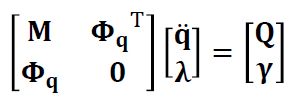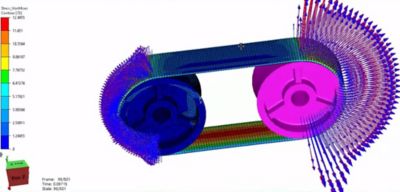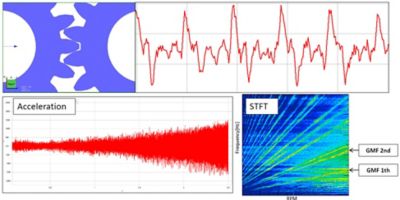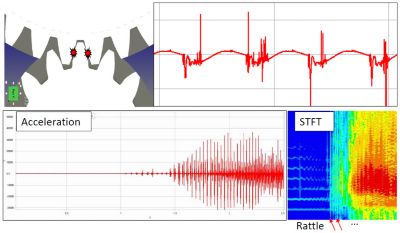-
United States -
United Kingdom -
India -
France -
Deutschland -
Italia -
日本 -
대한민국 -
中国 -
台灣
-
Ansys stellt Studierenden auf dem Weg zum Erfolg die Simulationssoftware kostenlos zur Verfügung.
-
Ansys stellt Studierenden auf dem Weg zum Erfolg die Simulationssoftware kostenlos zur Verfügung.
-
Ansys stellt Studierenden auf dem Weg zum Erfolg die Simulationssoftware kostenlos zur Verfügung.
-
Kontakt -
Karriere -
Studierende und Akademiker*innen -
Für die Vereinigten Staaten und Kanada
+1 844,462 6797
ANSYS BLOG
May 5, 2023
Multibody Dynamics: All Together Now
Cars, robots, industrial machinery, and even the human body are all systems in which many elements work together toward a coordinated outcome. Through seamless synchronization of their many interconnected parts, these interdependent systems are present throughout our world, in everything from bicycles and heart pumps to satellites. To design, optimize, and maintain these complex mechanical organisms, engineers rely on the predictive power of multibody dynamics simulation.
What is Multibody Dynamics?
A branch of structural dynamics, multibody dynamics simulation is an engineering method used to digitally model systems with many interconnected parts. Because these systems can be extremely complex — involving hundreds of bodies in constantly changing states of motion — multibody dynamics simulation is essential to predict a system’s complete behavior and structural worthiness.
By modeling the system in its entirety, engineers gain a clear picture of the cumulative impact of each body so they can test and validate outcomes holistically. With the help of multibody dynamics, both structural physics and affiliated physics can be investigated and understood.
Benefits of Multibody Dynamics Simulation
- Observe the transient dynamics within a system — every component from start to finish.
- Avoid the costs of physical testing by identifying potential design problems before an entire system is built.
- Explore how changes to system materials and configuration can optimize performance.
- Test systems against environmental conditions that are difficult to replicate.
- Model complex systems in their entirety to avoid the inaccurate results that can happen with localized or static simplifications.
When studying objects in motion (kinematics), there are a variety of quantities to consider, including position, velocity, acceleration, and time. Multibody dynamics simulation calculates these equations to reveal the thousands of behaviors that can be happening simultaneously while a machine’s many gears, joints, and mechanisms are actively in operation.
It all starts with Newton’s equation of motion, the famous F = ma (force = mass * acceleration). The transient dynamic equation for motion is represented here.

In this equation, q represents the generalized coordinates (position information for each entity) and Φ represents the Jacobian for the constraints. Using some more derivations, we can solve the position and other derived quantities.
When a project requires whole system modeling of both rigid and flexible bodies, engineers use software like Ansys Motion to get fast and accurate analyses. This integrated software can evaluate systems both as a whole and as components — all from a single solver — to dissect complex mechanical relationships and make better decisions faster.
Applications of Multibody Dynamics Simulation
Sent a document to print recently? Or ridden a 10-speed bicycle? Complex systems are all around us, and multibody dynamics simulation can be used to benefit a variety of fields and industries such as aerospace, industrial machines, robotics, biomechanics, and automotive.
In the automotive industry, multibody dynamics simulation is used to design, test, and optimize systems throughout a vehicle. Engineers can use simulation to see the overall behavior of the car or model one system at a time.
- Suspension: To keep a car’s handling smooth, the suspension system relies on the concerted effort of various dampers and stabilizers. Multibody dynamics simulation can model all the interrelated parts of a suspension system to optimize performance.
- Powertrain: Multibody dynamics simulation can be used to improve the design and behavior of powertrain components, such as the engine, transmission, and drivetrain, for better performance, efficiency, and durability.
- Safety: To evaluate the stability of a vehicle, multibody dynamics simulation can model vehicle kinematics in rollover tests.
- NVH: Controlling the noise, vibration, and harshness (NVH) levels within a vehicle is critical to passenger comfort and overall experience. By using multibody dynamics simulation, automotive engineers can identify the sources of vibration and sound emitting from all parts of a car and determine the best ways to address them.
Multibody Dynamics Example: Transmission Belt Drive
In this example, simulation is used to investigate the forces and stresses on the belt, as well as transmission efficiency.

Figure 1. Simulation showing transmission belt drive stresses
Multibody Dynamics Example: Automotive Drivetrain NVH
In these examples, simulation is used to investigate the issues of gear whine and rattle in the transmission of a car.
- ·Gear whine: noise caused by transmission error at gear meshes. Multibody dynamics simulation provides insight into how to reduce the excitation force by improving the gear tooth shape.

Figure 2. Short-time Fourier transform (STFT) analysis on surface vibrations to identify the dominant frequencies for vibration root cause analysis.
- Gear rattle: noise due to the torque fluctuation from the output shaft. Multibody dynamics simulation shows how the vibration of gear teeth within the working clearance causes an annoying sound.

Figure 3. STFT signatures for underlying issues can be easily differentiated. For instance, the waterfall plot for rattle in this image is different from the plot for whine (Figure 2).
Work Better Together
From heavy machinery to consumer goods, the systems that power our lives are complex and integrated. Multibody dynamics simulation helps engineers see these systems as a whole and ensure that every component is doing its job working toward the greater goal. To learn more about multibody dynamics simulation, watch the webinar Ansys Motion: Multibody Dynamics Solver.










